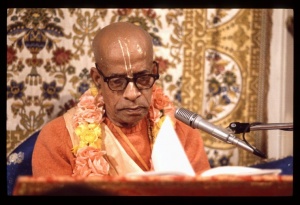SB 7.7.14: Difference between revisions
No edit summary |
(Vanibot #0054 edit - transform synonyms into clickable links, which search similar occurrences) |
||
| Line 23: | Line 23: | ||
<div class="synonyms"> | <div class="synonyms"> | ||
''ṛṣim'' | ''[//vanipedia.org/wiki/Special:VaniSearch?s=ṛṣim&tab=syno_o&ds=1 ṛṣim]'' — unto Nārada Muni; ''[//vanipedia.org/wiki/Special:VaniSearch?s=paryacarat&tab=syno_o&ds=1 paryacarat]'' — rendered service; ''[//vanipedia.org/wiki/Special:VaniSearch?s=tatra&tab=syno_o&ds=1 tatra]'' — there (in the ''āśrama'' of Nārada Muni); ''[//vanipedia.org/wiki/Special:VaniSearch?s=bhaktyā&tab=syno_o&ds=1 bhaktyā]'' — with devotion and faith; ''[//vanipedia.org/wiki/Special:VaniSearch?s=paramayā&tab=syno_o&ds=1 paramayā]'' — great; ''[//vanipedia.org/wiki/Special:VaniSearch?s=satī&tab=syno_o&ds=1 satī]'' — the faithful woman; ''[//vanipedia.org/wiki/Special:VaniSearch?s=antarvatnī&tab=syno_o&ds=1 antarvatnī]'' — pregnant; ''[//vanipedia.org/wiki/Special:VaniSearch?s=sva&tab=syno_o&ds=1 sva]-[//vanipedia.org/wiki/Special:VaniSearch?s=garbhasya&tab=syno_o&ds=1 garbhasya]'' — of her embryo; ''[//vanipedia.org/wiki/Special:VaniSearch?s=kṣemāya&tab=syno_o&ds=1 kṣemāya]'' — for the welfare; ''[//vanipedia.org/wiki/Special:VaniSearch?s=icchā&tab=syno_o&ds=1 icchā]'' — according to desire; ''[//vanipedia.org/wiki/Special:VaniSearch?s=prasūtaye&tab=syno_o&ds=1 prasūtaye]'' — for deliverance of the child. | ||
</div> | </div> | ||
Latest revision as of 23:05, 18 February 2024

A.C. Bhaktivedanta Swami Prabhupada
TEXT 14
- ṛṣiṁ paryacarat tatra
- bhaktyā paramayā satī
- antarvatnī sva-garbhasya
- kṣemāyecchā-prasūtaye
SYNONYMS
ṛṣim — unto Nārada Muni; paryacarat — rendered service; tatra — there (in the āśrama of Nārada Muni); bhaktyā — with devotion and faith; paramayā — great; satī — the faithful woman; antarvatnī — pregnant; sva-garbhasya — of her embryo; kṣemāya — for the welfare; icchā — according to desire; prasūtaye — for deliverance of the child.
TRANSLATION
My mother, being pregnant, desired the safety of her embryo and desired to give birth after her husband's arrival. Thus she stayed at Nārada Muni's āśrama, where she rendered service unto Nārada Muni with great devotion.
PURPORT
It is stated in Śrīmad-Bhāgavatam (SB 9.19.17)
- mātrā svasrā duhitrā vā
- nāviviktāsano bhavet
- balavān indriya-grāmo
- vidvāṁsam api karṣati
One should not remain in a secluded place with a woman, even one's mother, sister, or daughter. Nonetheless, although one is strictly prohibited from staying with a woman in a secluded place, Nārada Muni gave shelter to Prahlāda Mahārāja's young mother, who rendered service to him with great devotion and faith. Does this mean that Nārada Muni transgressed the Vedic injunctions? Certainly he did not. Such injunctions are intended for mundane creatures, but Nārada Muni is transcendental to mundane categories. Nārada Muni is a great saint and is transcendentally situated. Therefore, although he was a young man, he could give shelter to a young woman and accept her service. Haridāsa Ṭhākura also spoke with a young woman, a prostitute, in the dead of night, but the woman could not deviate his mind. Instead, she became a Vaiṣṇavī, a pure devotee, by the benediction of Haridāsa Ṭhākura. Ordinary persons, however, should not imitate such highly elevated devotees. Ordinary persons must strictly observe the rules and regulations by staying aloof from the association of women. No one should imitate Nārada Muni or Haridāsa Ṭhākura. It is said, vaiṣṇavera kriyā-mudrā vijñe nā bujhaya. Even if a man is very advanced in learning, he cannot understand the behavior of a Vaiṣṇava. Anyone can take shelter of a pure Vaiṣṇava, without fear. Therefore in the previous verse it has been distinctly said, devarṣer antike sākuto-bhayā: Kayādhu, the mother of Prahlāda Mahārāja, stayed under the protection of Nārada Muni without fear from any direction. Similarly, Nārada Muni, in his transcendental position, stayed with the young woman without fear of deviation. Nārada Muni, Haridāsa Ṭhākura and similar ācāryas especially empowered to broadcast the glories of the Lord cannot be brought down to the material platform. Therefore one is strictly forbidden to think that the ācārya is an ordinary human being (guruṣu nara-matiḥ).